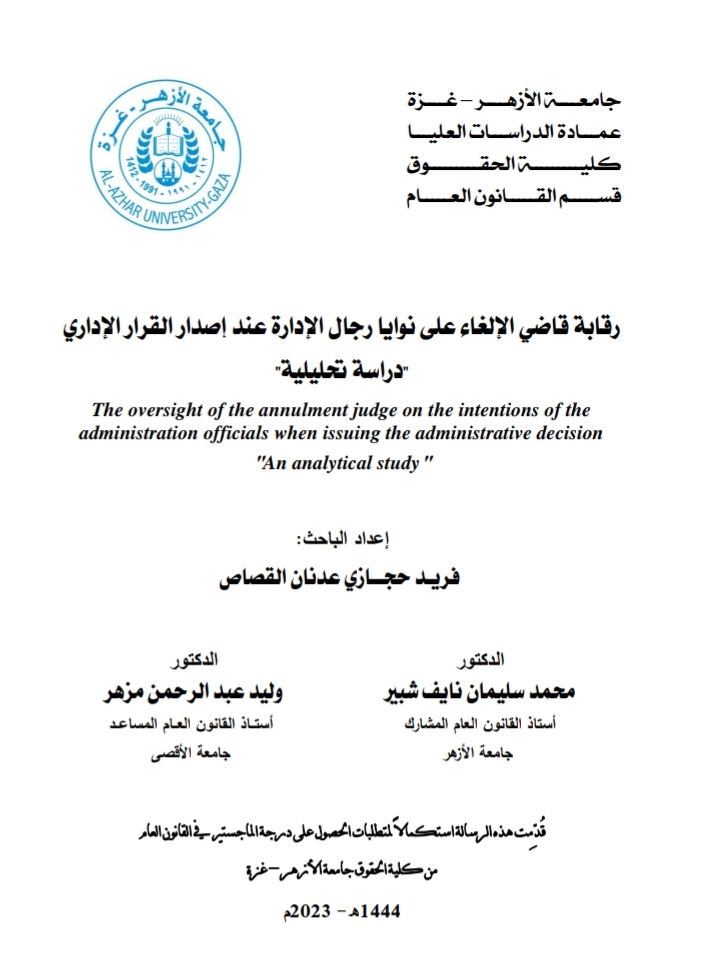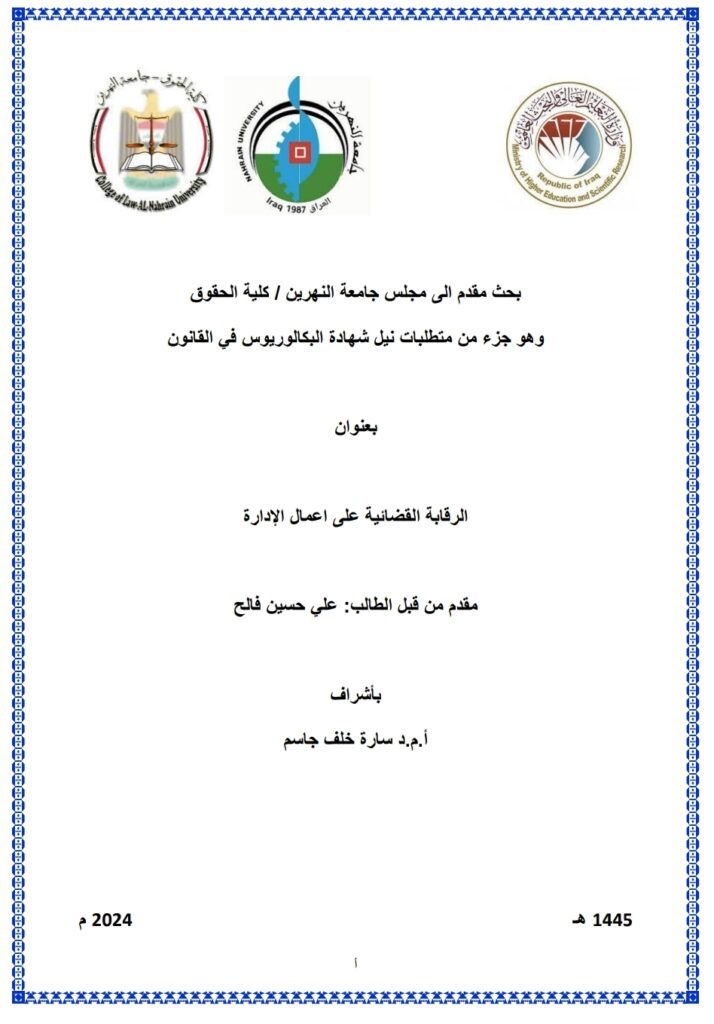رقابة قاضي الإلغاء على نوايا رجال الإدارة عند إصدار القرار الإداري دراسة تحليلية

رقابة قاضي الإلغاء على نوايا رجال الإدارة عند إصدار القرار الإداري دراسة تحليلية
الملخص
تناولت هذه الدراسة رقابة قاضي الإلغاء على نوايا رجال الإدارة عند إصدار القرار الإداري، وقد طرحت الدراسة إشكاليتها الرئيسة والتي تمحورت حول كيفية رقابة قاضي الإلغاء على نوايا رجال الإدارة عند إصدار القرار الإداري؟ ولما للنوايا من تأثير كبير في القرارات الإدارية فإن لها دوراً في وجود القرار، فهي جزء من عملية تشكل الإرادة، كما أن لها دوراً في تحديد مدى مشروعيته من حيث الغاية، وكون النوايا أمراً مستتراً وغير ملموس فإن ذلك يحقق صعوبة كبيرة في رقابة قاضي الإلغاء عليها.
ولتقديم دراسة وافية حول موضوع الدراسة اتبعنا المنهج العلمي التحليلي للنصوص القانونية ذات الصلة من خلال استقراء النصوص ذات العلاقة في قانون الفصل في المنازعات الإدارية رقم (3) للعام 2016م، والقرار بقانون رقم (41) لسنة 2020م بشأن المحاكم الإدارية وتعديلاته،
مسترشدين بالأحكام القضائية الصادرة عن محكمة العدل العليا الفلسطينية المتعلقة بموضوع الدراسة، مستأنسين ببعض أحكام المحكمة الإدارية العليا المصرية والآراء الفقهية، ولذلك قسمنا هذه الدراسة إلى فصلين تناول الفصل الأول منها ماهية القرار الإداري ودور النية في وجوده ومن
خلاله بينا تعريف القرار الإداري من حيث مشروعيته ووجوده وتناولنا فيه عناصر وجود القرار الإداري، وعرضنا في المبحث الثاني منه لماهية النية ودورها في وجود القرار الإداري، وفيه عرفنا النية وميّزناها عن غيرها من المصطلحات المشابهة، وعرضنا في نهاية الفصل لارتباط رقابة النية بالسلطة التقديرية لرجل الإدارة موضحين ماهية السلطة التقديرية ومبرراتها وحدودها واستبعاد رقابة
النية في قاعدة تخصيص الأهداف، وتطرقنا في الفصل الثاني لدور النية في رقابة مشروعية القرار الإداري من حيث غايته، ووضحنا ماهية عيب الانحراف باستعمال السلطة وطبيعته الشخصية والموضوعية، ومن ثم تطرقنا لخصائصه، ثم بيّنا حالات انحراف نوايا رجال الإدارة عن المصلحة العامة، وتناولنا كيفية إثبات نوايا رجال الإدارة أمام قاضي الإلغاء، حيث وضحنا قواعد إثبات عبء الانحراف باستعمال السلطة، ووسائل إثباته المباشرة المتمثلة بنص القرار وملف الدعوى وغير المباشرة كالقرائن المحيطة بالنزاع وعدم التناسب بين الخطأ والجزاء التأديبي.
وأنهينا الدراسة بخاتمة تضمنت النتائج والتوصيات التي خلصت إليها، ومن أهم هذه النتائج:
أن تأثير النية في القرار الإداري يكون على ثلاثة مستويات، الأول وهو تأثيرها من حيث وجوده، والثاني تأثيرها في الوجود الصحيح له والذي يجب أن يتوافق والإرادة المنبعثة من هذه النية، وأما الثالث فهو تأثير النية في مشروعية غايته، وأما أهم التوصيات: فهي ضرورة التعامل مع عيب الانحراف من قبل القضاء على أنه من العيوب الأصلية شأنها في ذلك شأن باقي عيوب القرار الإداري، وأن يكون عيباً متعلقاً بالنظام العام.
Abstract
This study dealt with how the annulment judge supervises the intentions of the
administration when issuing the administrative decision.
Since intentions have a great influence on administrative decisions, they have a role in
the existence of the decision, as they are part of the process that forms the will and have
a role in determining the extent of its legitimacy in terms of purpose, and the fact that intentions are hidden and intangible, this achieves the great difficulty in the oversight of
the cancellation judge.
The researcher followed the analytical scientific method of the relevant legal texts by
extrapolating the relevant texts in the Law of Resolution of Administrative Disputes No.
(3) of 2016, and Decree Law No. (41) of 2020 regarding administrative courts and its amendments, guided by the judicial rulings issued by the Palestinian Supreme Court of
Justice. related to the subject of the study, and based on some rulings of the Egyptian
Supreme Administrative Court and jurisprudential opinions.
The researcher divided this study into Tow chapters:
In the first chapter, it dealt with the nature of the administrative decision and the role of
intention in its existence, as well as the legality of the administrative decision, and we
dealt with the elements of the existence of the administrative decision. In addition to, it
dealt with the nature of intention and its role in the existence of the administrative
decision, distinguishing intention from other similar terms, and presented at the end of
the chapter the link between controlling intention with the discretionary power of the
administration man, explaining what the discretionary authority is, its justifications and
limits, and excluding intention control in the rule of allocating goals.
In the second chapter, he dealt with the role of intention in controlling the legality of the
administrative decision in terms of its purpose, and clarified what the defect of
deviation in the use of power is, its personal and objective nature, and then touched on
its characteristics, then he showed cases of deviation of the intentions of the administration from the public interest.
he dealt with how to prove the intentions of the administration men before the judge of
annulment, where he clarified the rules for proving the burden of deviation by using



